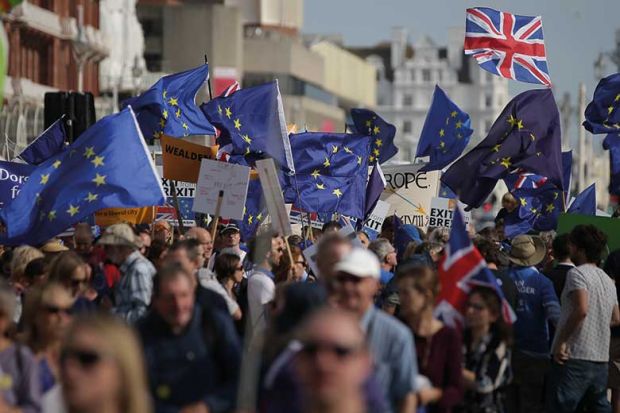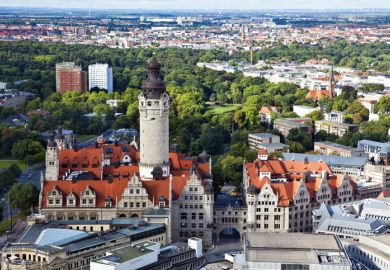Brexit will have a particularly profound effect on the UK’s universities: fewer students from Europe; fewer researchers and lecturers; and the loss of access to research funds in Brussels.
And although the British government has promised our British colleagues that it will make up for the lost European funding, this has not reassured them. Not only do they want to continue working with universities in Ireland and on the European mainland, but they also want to compete with them.
This helps them improve, they say. Because science is about both these things: collaboration and competition. Over the centuries, the two have brought science a long way. And it is on these that I am pinning my hopes because although it may sometimes seem as though the world is falling apart, we should never underestimate universities as a vital and connecting force.
In 1796, with war raging between the French Republic and Britain, biologist and president of the Royal Society, Sir Joseph Banks, wrote in a now famous letter to his French colleague: “The science of two nations may be at peace, while their politics are at war.”
Why do countries allow their universities and academics to work together when they are in the midst of a blazing row? Primarily because countries need each other to achieve scientific progress.
A good example of this is the space research programme of the Soviet Union and the US – research that is way too big and expensive for one country and therefore research that countries need each other for.
More than ever, the big issues faced by individual countries are common to us all: climate change, migration, infectious diseases, energy, pollution and cyber security. Collaboration then becomes a form of enlightened self-interest.
Research and education are also forms of soft power in the often somewhat complex international relations between countries and blocs of countries. And as a country you can make use of that soft power too. Science diplomacy is what we call it. Through this, universities contribute to science and peace at the same time.
Although the relationship between Europe and Russia is very strained, for example, they work well together in research and education. The same is true for the US and Cuba. European Commissioner for Research, Science and Innovation, Carlos Moedas, put it like this: “I believe that science diplomacy can light the way where politics and diplomacy have failed.”
This is how research and education bring people together all around the world – through scientific conferences, journals, mails and social media. And students have become increasingly international too.
For years now, European students have been meeting fellow students from other countries through the European Erasmus programme. And the marriages born from these meetings have in turn given birth to a million “Erasmus babies” – or so it is claimed.
Student mobility is growing not just in Europe but all around the world. The expectation is that by 2025 some three to five million students will study in a country they were not born in.
All these researchers and students are spinning a web across our planet, a web of people who talk, think, write and stay up all night in their student houses dreaming together. These are dreams about solving the big issues of our time and about bringing the world together to make it a better place.
It’s a web through which the core values of science – freedom of thought, rationality, transparency and universality – are conveyed globally, however difficult that may be for some countries.
So how harmful will Brexit be to this ecosystem? I predict that universities on both sides of the North Sea will find new ways to work together that may just strengthen their collaboration. Almost all universities have dealings with UK and European counterparts. The universities of Maastricht and York recently formed a partnership, as have those of Oxford and Berlin, and of Cambridge and Munich.
In a few years’ time, UK and EU universities might just offer joint degree and research programmes and have joint institutes. Or there could be British campuses on mainland Europe that work closely with EU universities.
In short, Brexit will act as a catalyst. When he took office, French president Emmanuel Macron even proposed establishing a network of European universities. This would help create a new generation of European citizens and would make higher education throughout Europe more competitive.
Even if you have your doubts about “European universities”, a new energy will still be generated. Witness what is happening along a border that has seen some of the heaviest fighting in Europe’s history. EUCOR: The European confederation of Upper Rhine universities, an association of the universities of Basel, Freiburg, Haute-Alsace and Strasbourg and the Karlsruhe Institute of Technology, sits between France, Germany and Switzerland. It has developed joint research and educational programmes and presents itself as “five universities, three countries, one campus”.
Where millions of young men once lost their lives, young people are now studying together. One thing we can be sure of is that the vital and connecting force of research and education and the dreams of young people will continue to surprise and inspire us – even after Brexit.
This is an abridged version of an address given by Rector Stolker on 8 February to commemorate the 444th anniversary of Leiden University.
Carel Stolker is rector magnificus at Leiden University.
POSTSCRIPT:
Print headline: Brexit will be a catalyst
Register to continue
Why register?
- Registration is free and only takes a moment
- Once registered, you can read 3 articles a month
- Sign up for our newsletter
Subscribe
Or subscribe for unlimited access to:
- Unlimited access to news, views, insights & reviews
- Digital editions
- Digital access to THE’s university and college rankings analysis
Already registered or a current subscriber?






